We are excited to present the 2023 Marshall Online annual report. This report provides a summary of our current and future projects. We are grateful to our faculty, staff, and students who have contributed their ideas, time, and talents to ensure online education continues to adapt and innovate. Our goal is to support the needs of our diverse learners by adopting education technology tools to our online ecosystem. Through our many degree programs and certificates and our newly launched microcredentials, learners have the flexibility they need to succeed. We look forward to working with you as we continue to refine our online education offerings.

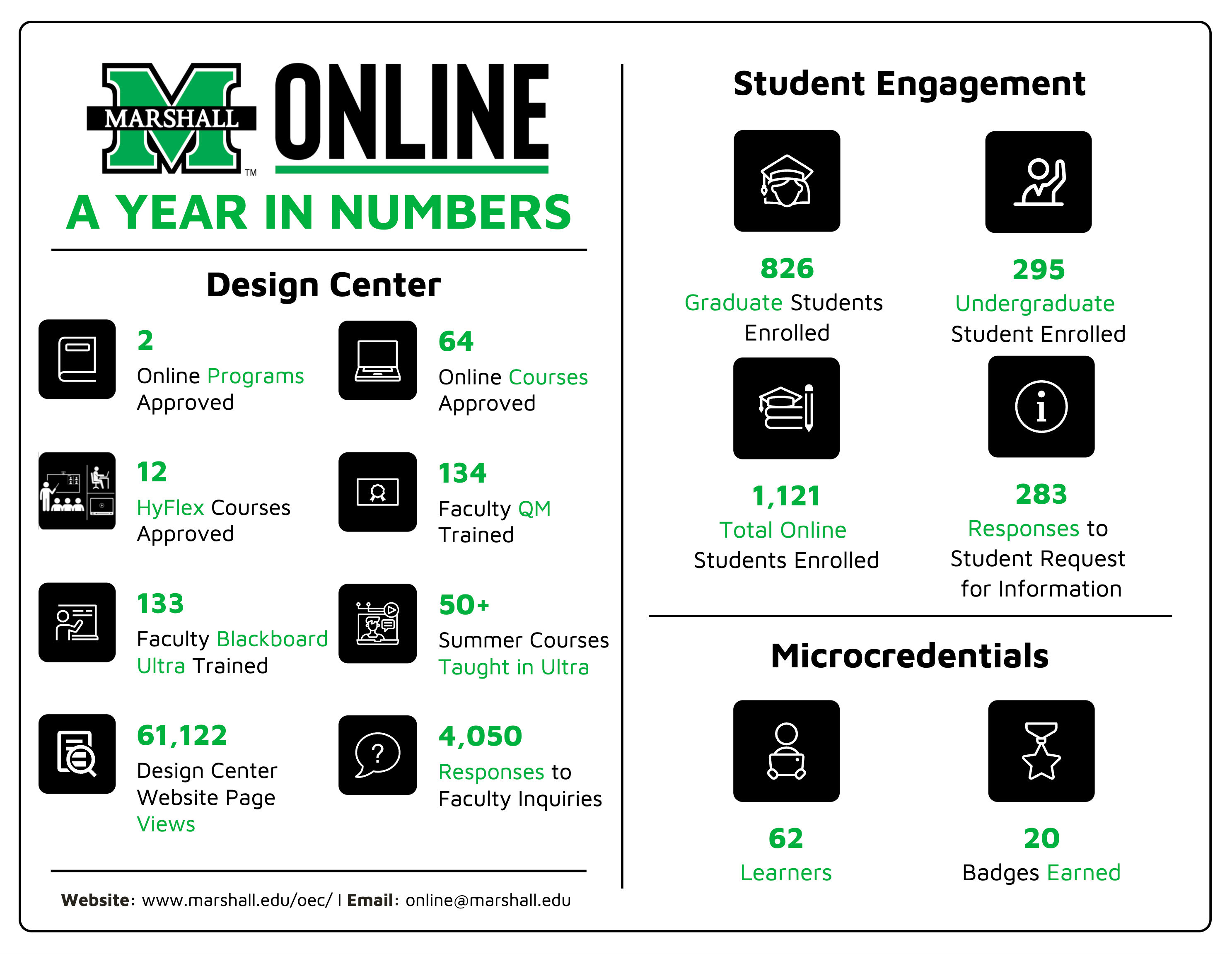
Summary of Accomplishments
Marshall Online enhanced online education across campus by: 1) increasing our online offerings, 2) improving our communication and outreach channels, and 3) joining state and national conversations.
1. Increased Online Courses and Programs
This year, Marshall Online approved two more online degree courses to add to its offerings: M.S.E. in Engineering Management and Graduate Certificate in Human Geography.
To expand flexible course offerings in response to student demand, Marshall Online coordinated a HyFlex pilot. Twelve faculty from five different colleges participated, serving 298 students. The pilot established some of the infrastructure to invite more HyFlex courses, including a HyFlex Guiding Principles document, technology-enhanced classrooms, and substantial faculty feedback to continue to enhance resources and support for future HyFlex faculty.
Marshall Online also revised policies to improve equity and access for online students. We revised policies to 1) bundle e-course delivery fees into the total cost of tuition so that online students were not paying more, 2) allow staff to use tuition benefits to enroll in online degree programs, and 3) allow online graduate students to have assistantships.
2. Improved Communications
We launched our new Marshall Online website in February. To make it easier for students to find information about our online programs, we streamlined the design of our Marshall Online Programs page. We reorganized the long list of programs into visually enhanced tiles with easy-to-skim key information and direct links to more information about the specific majors. We also streamlined our student processes by adding an Apply Now button, Chat feature, and a Learn More button. This project required substantial collaboration with departments across campus to ensure that we had the most up-to-date information for every program.

In addition, we launched our monthly Marshall Online Newsletter to give us a platform for keeping faculty and other stakeholders updated on new website content and news. For example, each month, we send updates on the Ultra upgrade, a Best Practices in Teaching and Learning series, a Tech Tool Tip of the Month, In the Know information, a Faculty Spotlight, and timely student resources and events for faculty to share.
- May issue: Highlights include news about our launch of Ultra Academy, transparency as a best practice for online teaching, and Community Cares Week.
3. Joined State and National Conversations
By participating in larger research networks, we have given faculty and students a platform to amplify their voices around online courses. Marshall was selected into the third cohort of WGU Lab’s College Innovation Network, which allowed us to see, via EdTech surveys, student and faculty perceptions of edtech and online courses. The results from our institution have helped to inform our Ultra implementation strategies and course review processes. Furthermore, seeing our results within the context of other institutions nationally has helped us not only respond to issues but to shape experiences proactively. For example, our participation has helped us connect our work to belongingness resources and inform our own belongingness initiatives.
Marshall Online has connected with other organizations this year that enhance our service to students and faculty. We serve on Anthology’s Global AI (Artificial Intelligence) Committee. Our participation on this committee means that we can stay as informed as possible and advocate for faculty and students who will experience Anthology’s AI via Blackboard Ultra. The team explored Mural, a visual collaboration tool, by serving on Mural’s first Faculty Development Pilot. We joined the Association for Undergraduate Education at Research Universities and the UPCEA (University Professional and Continuing Education Association) as well.
At the state level, Marshall Online held a training session on State Authorization and Professional Licensure Disclosures on December 7, 2022. As a postsecondary educational institution, Marshall University is legally mandated to follow the laws established in states where we conduct business (online courses, field experience, faculty teaching, recruiting, and marketing); this includes obtaining any necessary authorization to operate in that jurisdiction prior to conducting an activity. This training served as an opportunity to educate and inform university members of our processes to best prepare us to handle State Authorization and Professional Licensure.
Special Acknowledgements to:
- Jodie Penrod, Bob Hall, Cody Hall, Eric Himes: Special Projects
- Ben Eng: Design for Delight initiative
- Marshall Affordability partners: Matt Tidd, Alice Roberts, Carl Mummert, Michael McGuffy
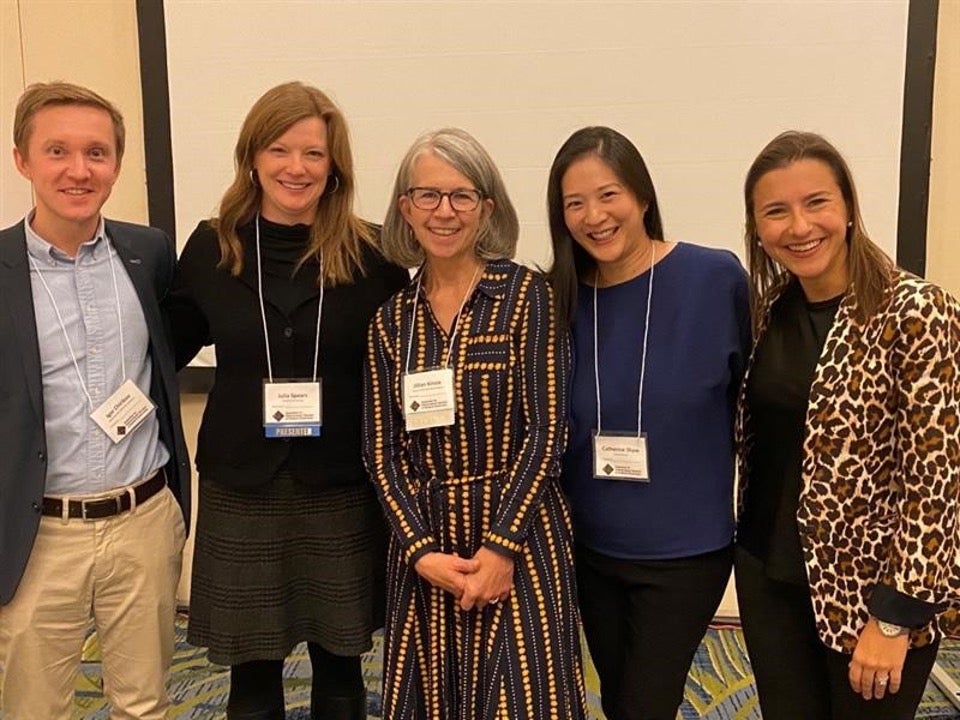
Summary of Accomplishments
The Design Center improved faculty service by 1) collaborating with faculty on the Ultra transition, 2) streamlining our course development processes, and 3) enhancing outreach to faculty via partnerships, support, and professional development.
1. Ultra Implementation
The Design Center launched the first phase of implementing Blackboard Learn Ultra across Marshall. Moving to Blackboard Learn Ultra will help us optimize teaching and learning experiences for faculty and students, and it aligns with Marshall’s strategic goals related to student success. In part to support this transition, we have expanded from four instructional designers to five, increasing opportunities for one-on-one faculty consultations and workshops.
Faculty are significantly impacted by this change, so it is important to us that we collaborate with faculty throughout the transition to Ultra. To this end, we formed an Ultra Advisory Board that includes faculty “power” users and chairs across ten different colleges, and the CTL (Center for Teaching and Learning). These faculty representatives were the first to be trained in Ultra, and their questions and suggestions have been crucial in our implementation process. They will lead the way teaching in Ultra.
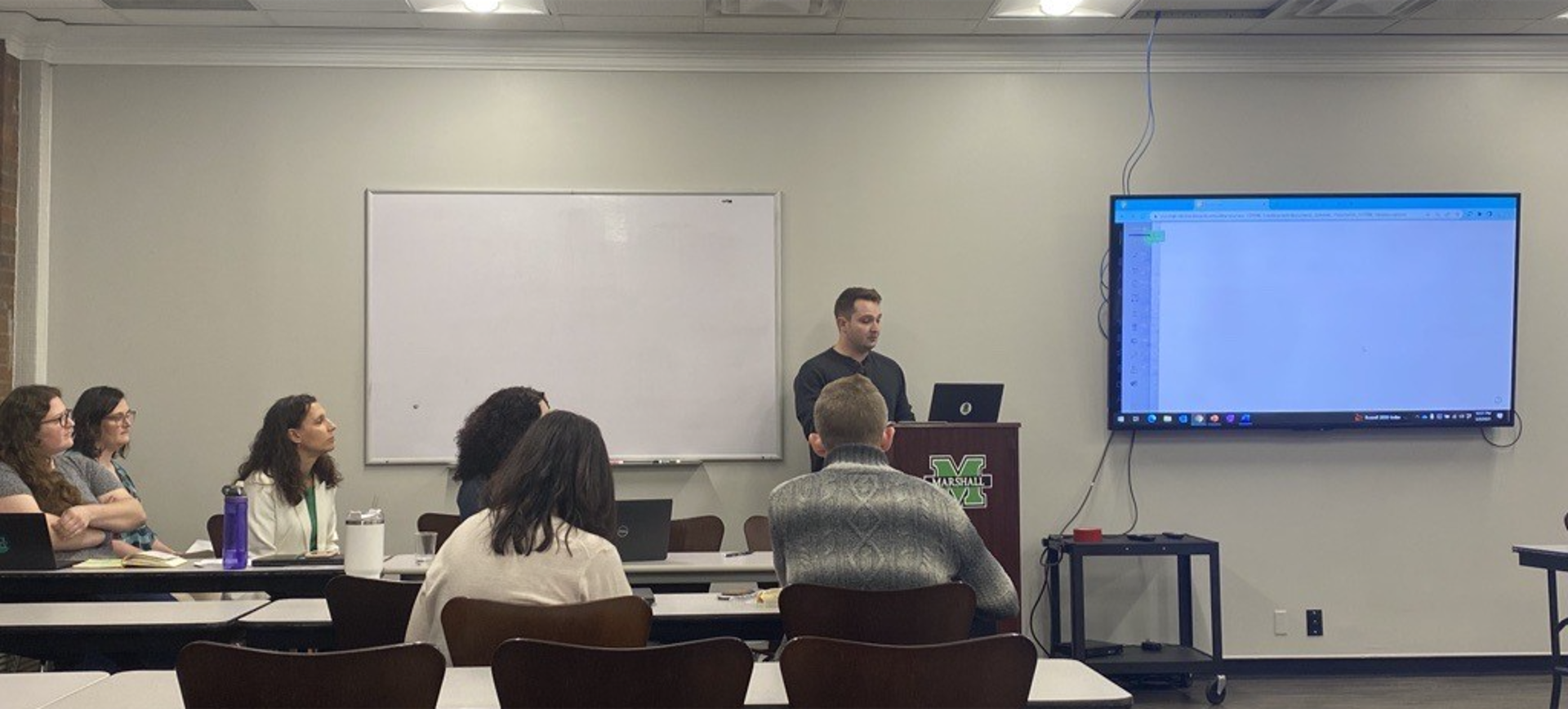
We used the Ultra Advisory Board’s feedback to enhance our training approaches and resources to address a wide range of faculty needs. Our website includes an Ultra Self-Starter Guide, Best Practices for Course Building, and a growing Knowledge Base.

For a deeper dive into Ultra, faculty can take the Design Center’s intensive and asynchronous Ultra Academy microcredential and earn a Credly badge.Designed as a workshop, the five modules allow instructors to experience Ultra in a hands-on manner and build content for their course along the way. The modules, which are framed around pedagogical best practices, include Getting Started, Building Content, Assessing Learners, Enhancing Course Communication, and Course Completion (reflection).

To reach as many faculty as possible, the Design Center has hosted trainings in multiple formats. We presented five sessions at Marshall’s iPED (Inquiring Pedagogies on Teaching and Learning) conference, offered 20 summer workshops on Ultra in general, and hosted routine weekly workshops on specific tools. All our trainings are available to join on our Teams Channel, Distance Education Support Community.
As of July 2023, we have over 130 Marshall full-time faculty who are Ultra-trained and more than 50 summer course sections in Ultra. We are on track to complete Ultra implementation – offering all Marshall courses in Ultra – by Fall 2024.
2. Course Development
We listened to faculty via focus groups and EdTech surveys to refine our course development process. Our new Distance Course Development Process infographic (below) outlines all the steps more clearly, and our new dynamic form expedites the course review signature process. We also created a Hybrid Checklist, a course review checklist informed by faculty feedback that provides an alternative to QM (Quality Matters) for hybrid courses, and, in line with Marshall’s student experience initiatives, incorporates best practices for student experience and retention. We are piloting this checklist in Fall 2023 as a “course enhancement” option as we continue to refine it. Our new Best Practices for Teaching and Learning series offers monthly pedagogical strategies that align with both our course review process and the Ultra upgrade.

Even as we develop alternatives to QM, we are taking steps to ensure that all courses currently meet standards for quality in online course design by ensuring that our own instructional designers are QM certified to facilitate face-to-face workshops on campus. Prior to the Fall 2023 semester, Marshall will host a Quality Matters workshop to certify instructors for best practices online in an Improving Your Online Course workshop (IYOC). This will enable the addition of new online courses as well as programs.
3. Faculty Partnerships and Support
The Design Center collaborated with faculty on projects related to course enhancement and student experience. To support faculty use of course tools, we worked with Marshall’s Center for Teaching and Learning (CTL) for an Online Pedagogy and Practice Workshop.
We partnered with individual faculty to develop and pilot the Belongingness Project in two online courses. Informed by Dr. Kevin Binning of the Pitt Transition Study on belonging and Geoffrey Cohen’s book, Belongingness: The Science of Creating Connection and Bridging Divides, this project integrated belongingness interventions at four inflection points during the semester: a welcome video from the instructor, an article about common course-related student struggles, an anonymous Mural check-in, and an exit survey. Visit our Faculty Spotlight on Dr. Laura Stapleton to learn more about the pilot.
 As we continue to champion belongingness efforts for online students, we have tapped into thought-leaders Dr. Kevin Binning, principal investigator for the Pitt Transition Study and Dr. Omid Fotuhi, Director of Learning Innovation at WGU Labs, to create a Marshall belongingness intervention for online students. Dr. Wendi Benson, Marshall Assistant Professor of Psychology, is partnering with us to create, study, and scale up this online belongingness intervention.
As we continue to champion belongingness efforts for online students, we have tapped into thought-leaders Dr. Kevin Binning, principal investigator for the Pitt Transition Study and Dr. Omid Fotuhi, Director of Learning Innovation at WGU Labs, to create a Marshall belongingness intervention for online students. Dr. Wendi Benson, Marshall Assistant Professor of Psychology, is partnering with us to create, study, and scale up this online belongingness intervention.
The launch of our Design Center website has allowed us to build a robust archive of information and resources for faculty:
- Design Team: Contact information and specializations for all five of our designers.
- Workshops and Events: Our regularly updated calendar of workshops.
- Ultra Transition: Information on the transition to Ultra and how to get started.
- Course Development: The process and deadlines for course development.
- News: Announcements and information.
- Standards and Policies: QM standards, Hybrid Checklist, and other policies.
- Course Help: Contact information and Frequently Asked Questions.

Special Acknowledgements to:
- The Ultra Advisory Board, Ammar Alzarrad, Haroon Malik, Marc Sollosy, Yi Duan, Lisa Heaton, Chris Sochor, Sandy Prunty, Liz Pacioles, Damien Arthur, Wendi Benson, Hilton Cordoba, Nathan Rucker, Kim DeTardo-Bora, Laura Stapleton, Sarah Mollette, Chris Schletter, Craig Kimble, Todd Green, Richard Egleton, Billy Biggs, April Fugett, Chris Atkins
- Bob Glasser: Transition to ServiceNow ticket system
- Sarah Ulrich: Transition to Dynamic Forms
- Dr. Jon Saken and Dr. Laura Stapleton: Belongingness Project
Summary of Accomplishments:
The Office of Student Engagement prioritized seamless experience and a positive journey for online students through our work with 1) the Student Experience Project, 2) student focus groups, and 3) online student events and resources.
1. Student Experience Project
It is important to us that our online students have a positive experience at every point in their Marshall journey. Marshall Online partnered with Information Technology to lead this student experience initiative. We want to especially recognize the support of IT (Information Technology) in assigning our project manager Cody Hall, IT – Academic Technology Experience, who coordinated meetings across campus, organized workflows, and led the writing of our report.

With the help of several stakeholders, including Marshall administration, college leaders, online faculty, and online students, we mapped out the online student experience at Marshall. Our guiding principles for this project included:
1) understand the online student experience lifecycle, 2) streamline internal processes for efficiency and value-added services, and 3) observe and record how the student progresses through the point of inquiry to when the student starts courses at Marshall.
Our research has informed several of our current initiatives and ongoing improvements. According to our Student Experience Report (June 2023), the strategies identified to enhance the online learning experience include:
- “hiring dedicated staff for online student support”: We added the position of Director of Student Engagement in April 2023.
- “implementing Genius Micro-Credentialing”: As part of the Marshall For All, Marshall Forever plan, Marshall Skills Exchange is being piloted this summer and ready to launch in Fall 2023.
- “upgrading the Learning Management System to Blackboard Ultra”: The more intuitive version of Blackboard is more accessible for students on mobile devices and uses a more consistent layout across courses.
- “offering increased flexibility with hybrid and asynchronous learning environments”: Our HyFlex pilot has helped us develop the infrastructure for more HyFlex and hybrid learning. See more about the pilot above. (1)
We are excited about all we have learned from the Student Experience Project and look forward to continuing to refine our systems and processes that support a meaningful, engaging, and seamless experience at Marshall Online.
2. Focus Groups
The Office of Student Engagement also sought out reflections from current and completed online students to celebrate their positive experiences and suggestions for improvement. Students were contacted via email asking for volunteers for four group segments: Current undergraduate, Current Graduate, recently completed undergraduate and recently completed graduate students. The overwhelming theme was a feeling of disconnect.
Several online students shared their thoughts:
- Several students expressed a feeling of disconnect with fellow students and professors. They stated positive experiences with classes that had interaction among students and professors in the form of discussion questions, Teams meetings, and breakout rooms. Students perceived these as the best courses.
- Focus group students expressed disappointment that they were not included in campus groups and clubs. We are working to have virtual memberships added to campus groups.
The feedback we collected from the focus groups informed several new initiatives, including a communication plan and New Online Student Orientation. As part of our priority to improve the online student experience, especially their connection to Marshall, we are encouraging more online students to attend Week of Welcome (WOW).
3. Events and Resources
To continue to enhance our outreach to students, Marshall Online’s Office of Student Engagement improved communication channels by hosting student events and developing online communication opportunities.
We hosted three Fireside Chats, which are events specially tailored to our online students. These chats are held online with different leaders of the university community. In our Fireside Chat with President Brad Smith, he discussed his vision for the university and online learning. In another Fireside chat, three guests — Lindsey McKelvey (graduate student representative), Olivia Moncada (undergraduate student representative), and Katie Stanley (Coordinator of Student Activities) — discussed Enhancing the Online Student Experience. In our spring chat, Cris McDavid from Career Education spoke to students about Launching into Careers as Marshall University Graduates. Our Fireside Chats have been well attended, attracting 41 synchronous participants in all, and the recordings are also available for students not able to attend.


In addition to these events, we also built an online inquiry communication plan, created a robust student services webpage, and added a Chat feature to our online pages. We participated in Green and White Days, Countdown to Commencement, and Herd Con, all of which helped us recruit prospects, serve current students, connect with campus partners, and generally increase our presence on campus and in the community.

Finally, as the student engagement team is a new campus unit, we have focused on establishing and cultivating collaborative relationships with campus partners. One of the team’s primary goals is to support the holistic needs of online students throughout the student lifecycle. To do so, it is essential that we have a solid understanding of campus partner’s process processes and services. To date the team has established partnerships with:
- Career Education, Center for Student Success, Counseling Center, Disability Services, Enrollment services, Intercultural and Student Affairs, HELP Program, The Herd Start Academy, Tutoring Services, Writing Center, Undergraduate Academic AdvisingWriting Center
The team is also working with Graduate Studies to build an online orientation in Blackboard curated for graduate students. The orientation will serve multiple purposes: 1) to onboard new students with the information needed for success 2) to be a resource for continuing students throughout the educational journey and 3) to be a recruiting tool for prospective students who may want additional information on being a Marshall student. Its content includes videos from several university leaders to help students see the faces behind the offices they will encounter and an Ultra orientation to help them feel confident navigating their courses. The online orientation in Blackboard will allow students to review the content on-demand at their convenience.
Special Acknowledgements to:
- Career Services – promotion of programs for online students, Alumni, Undergraduate Admissions, Graduate Admissions, College leaders for online programs, Graduate Studies, Intercultural and Student Affairs, Undergraduate Advising, IT (Information Technology) Systems, Marketing and Communication
Summary of Accomplishments
The Marshall Skills Exchange (MSE), Marshall’s first microcredential platform, now has the infrastructure to launch in Fall 2023. All microcredential courses offered through the MSE should provide in-demand knowledge — providing market-driven and future-focused programs that are beneficial for society and the economy, on-demand delivery — participating in contemporary learning environments that offer a selection of options that are available in the classroom, at an employer’s site, or online, synchronous or asynchronous, with inter-disciplinary and experiential methods of learning, and distinctive achievement — choosing signature programs where we will double down to set the standard and differentiate. To make this possible, we have developed key partnerships and integrated this ecosystem across five platforms: Dynamic Forms, Genius, TouchNet, Blackboard Ultra, and Credly.

1. Key Partnerships
We have a few pilot programs running this summer, including Ultra Academy offered through the Design Center. Our partnerships with Marshall University Innovation Center, Advanced Manufacturing Center, and School of Aviation have resulted in 12 microcredential courses so far. There are 7 courses being offered through the Advanced Manufacturing Center focusing on CNC Milling, different ACENet camps, Lathe Operator, and Robotics in Manufacturing. The Marshall School of Aviation offered individualized courses in Private Pilot License training along with a Ground School course. The Innovation Center offered an Innovation Explorer course that was offered during this pilot phase to members of Marshall’s IT department as well as the students participating in the Governor’s School of Entrepreneurship. The Design Center also piloted a microcredential course called Ultra Academy. This course is used as an asynchronous course for faculty wanting to learn the ins and outs of the new LMS upgrade in Blackboard Ultra.


2. Badging System
When learners take courses through the Marshall Skills Exchange, they earn the microcredential and a digital badge. Our courses are housed in Genius, which includes our registration system, course catalog, and administrative information. We have established TouchNet as our payment portal, allowing learners to conveniently pay using a credit card. All courses are delivered via Blackboard Ultra, which makes the learning management system consistent for Marshall students and employees. Our digital badges are issued through Credly after successful completion of the course. These Credly badges can be shared on LinkedIn or social media and can be used to verify and validate that specific competencies have been achieved.

The Marshall Skills Exchange is already gaining traction at Marshall and joining national conversations. We introduced it in May at Marshall’s iPED conference. In May, we also facilitated the College Innovation Network (CIN) Partnership in Practice meeting, which allowed us to converse with other institutions offering microcredentials about the process of starting and implementing this new pathway for learners to upskill and reskill. So far, we have seen 20 learners earn badges through the Marshall Skills Exchange.
Earning a Microcredential

Special Acknowledgements to the Microcredential Steering Committee:
Carl Mummert, Shawn Schulenberg, Julia Spears, Ben Eng, Paige Leonard, Michelle Biggs, Clinton Brown, Raj Khanna, Eugenia Lambert, Cynthia Jones, Josh Brunty, Bob Hall, Haroon Malik, Kacy Lovelace, Diana Adams, Christine Ingersoll, Kumika Toma, Jim Harris, Casey Baker
Events
Marshall Online participated in several campus events this year to recruit students and build our campus presence:
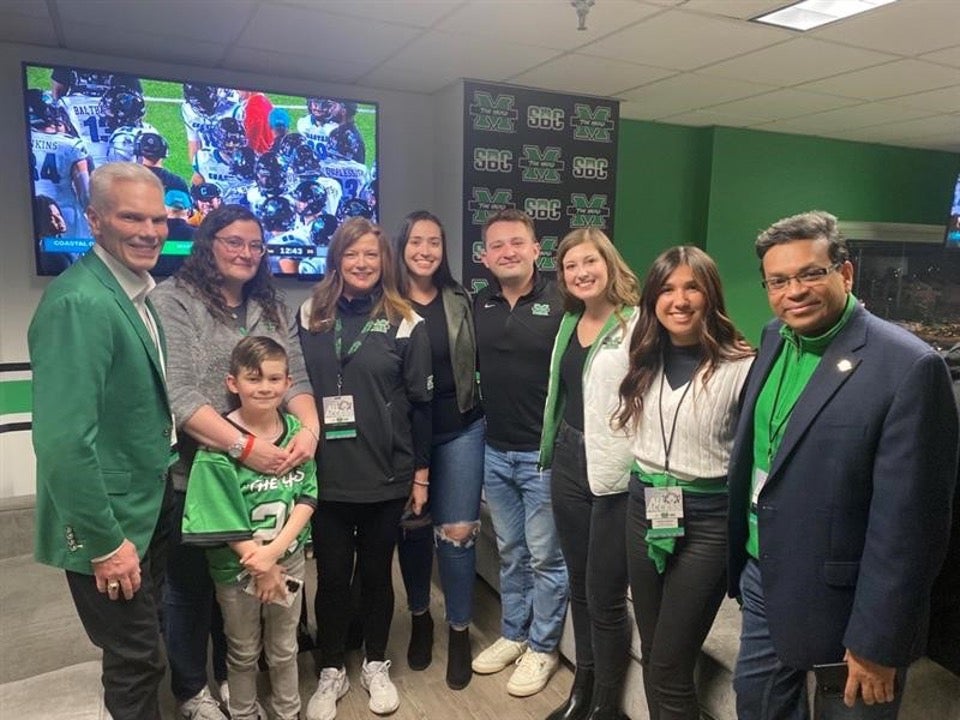
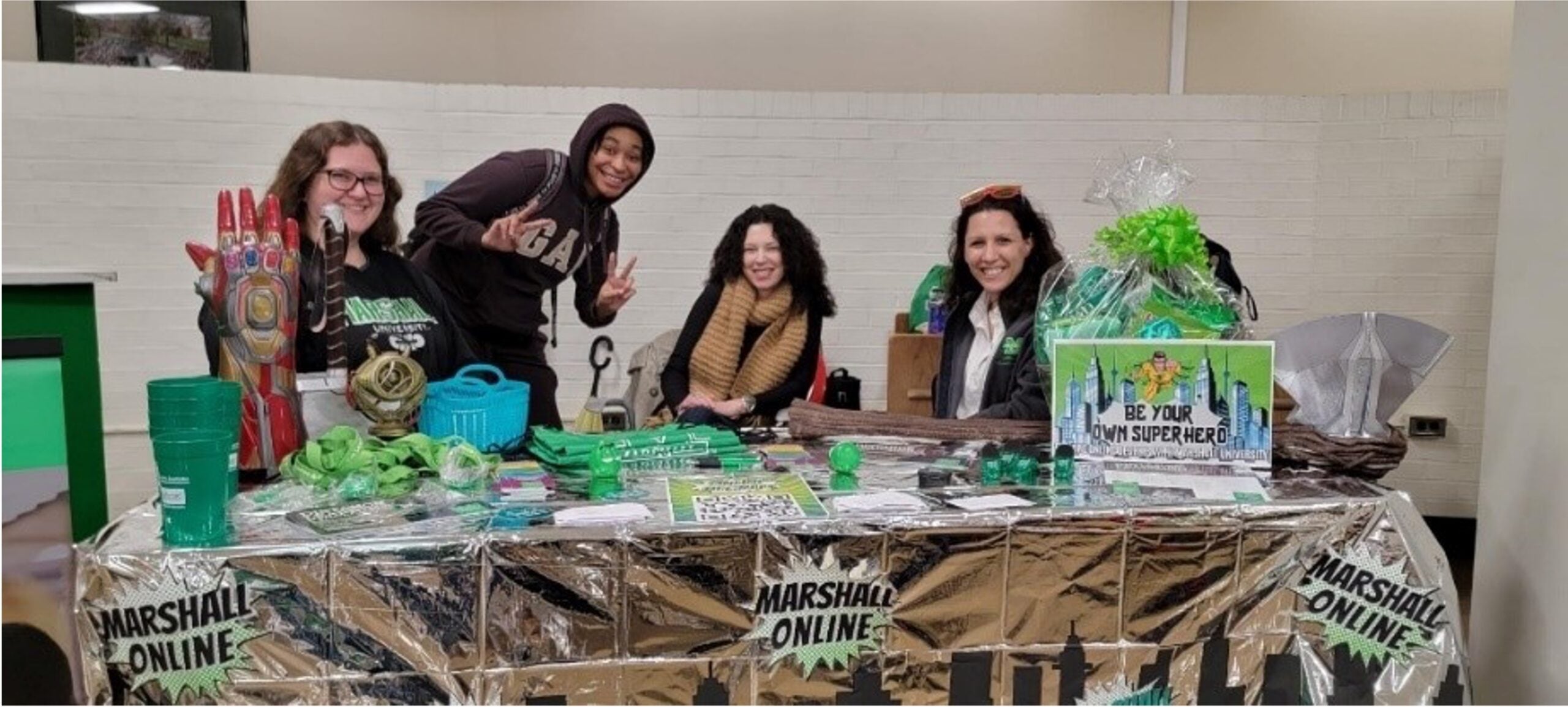
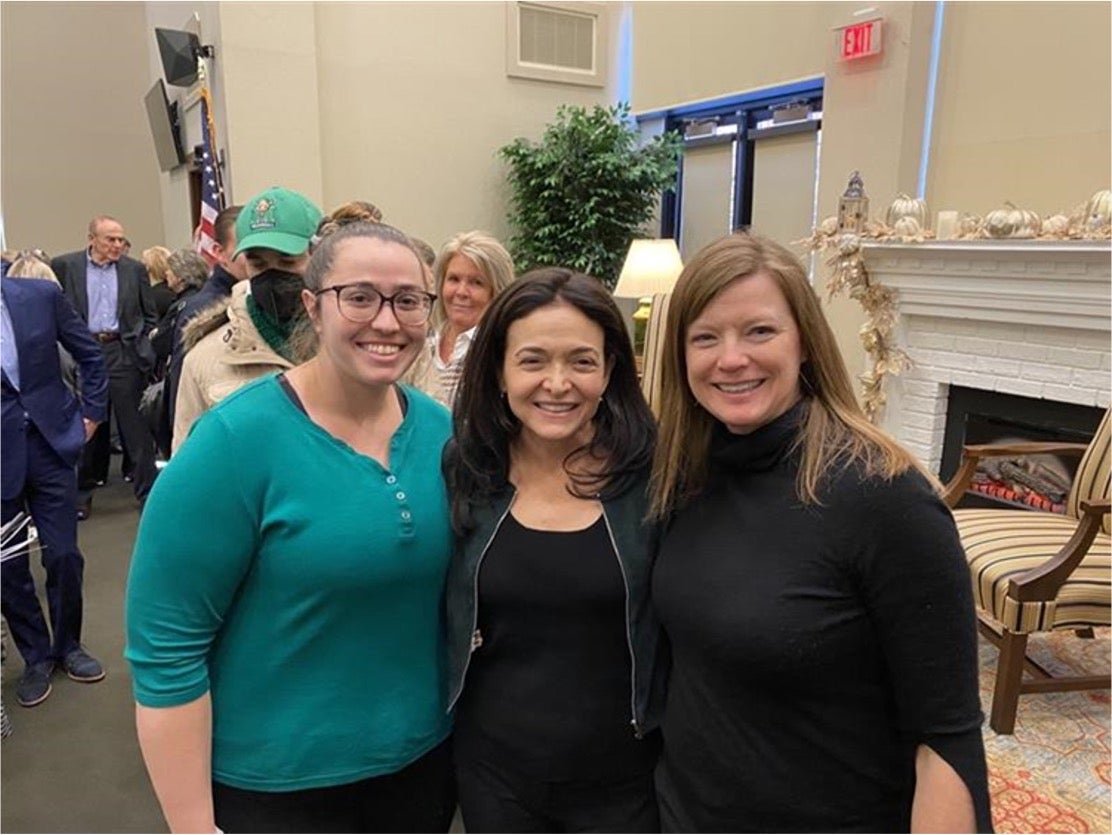
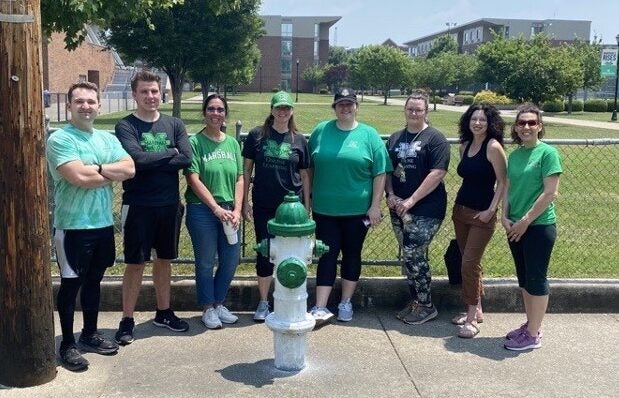
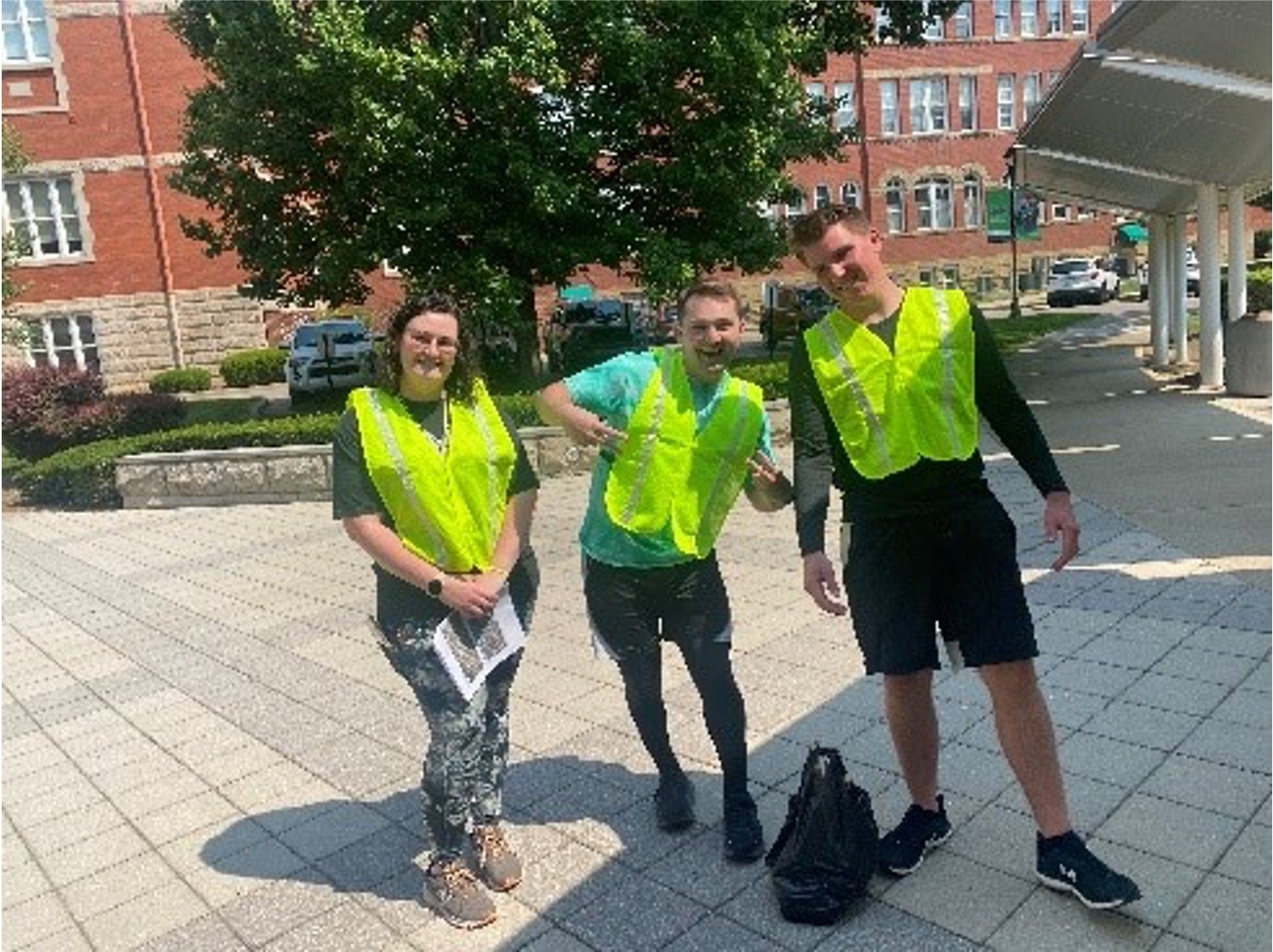
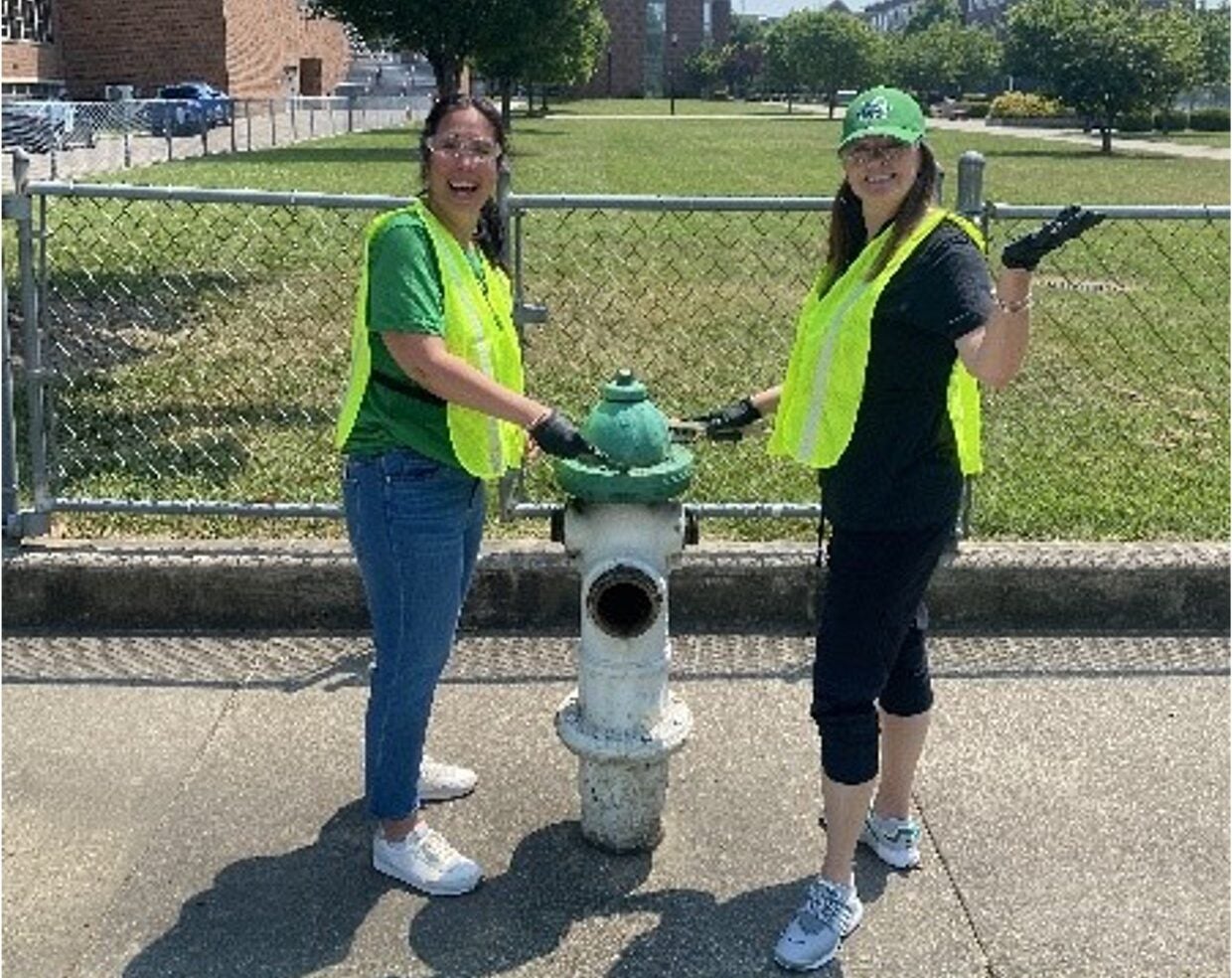
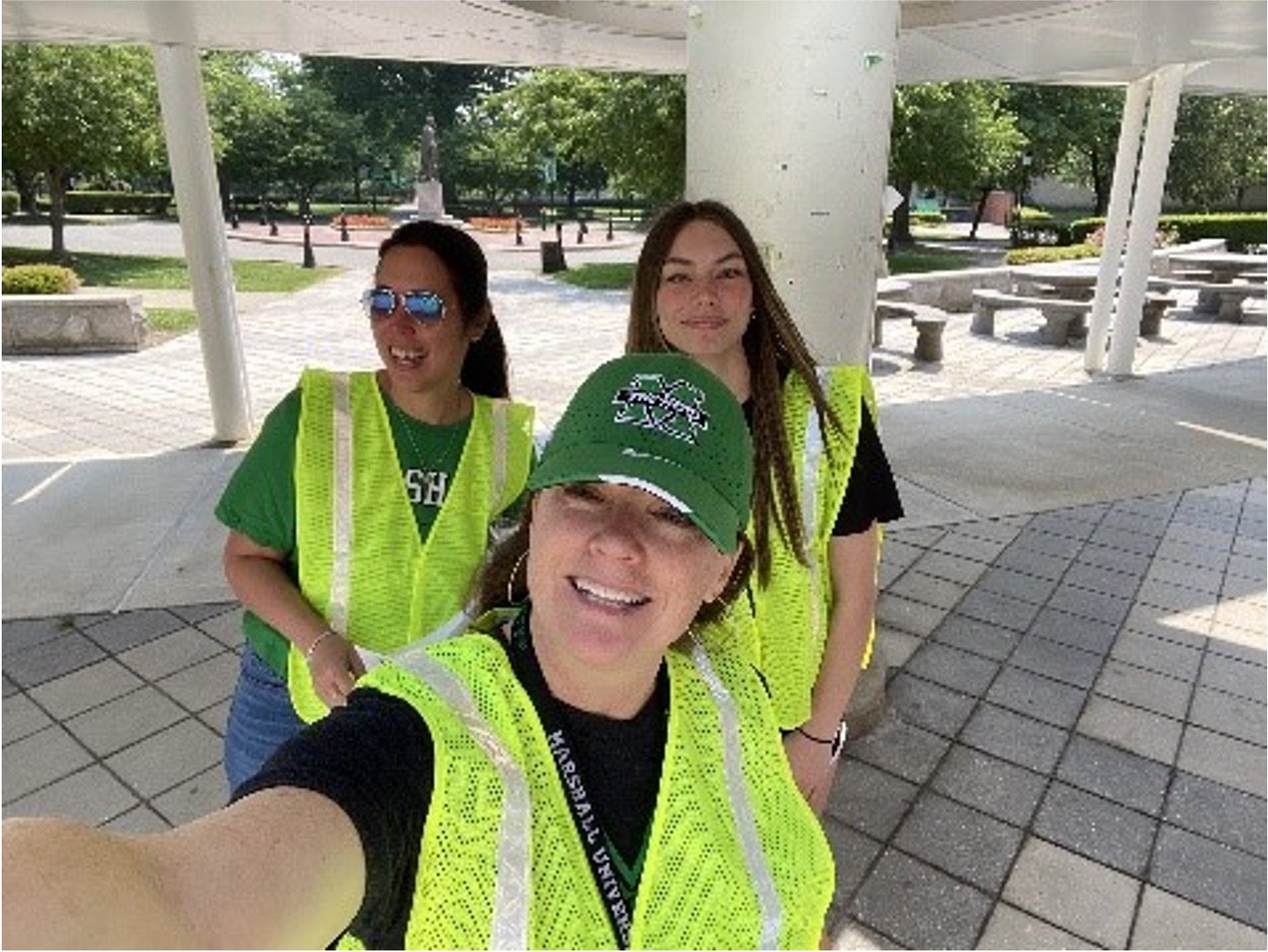
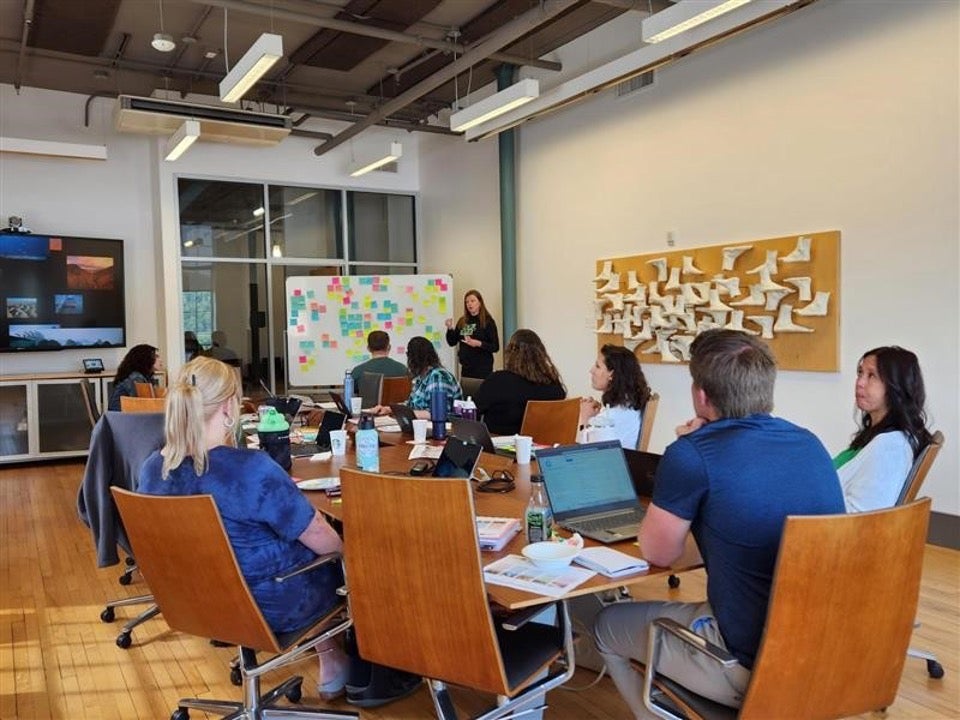
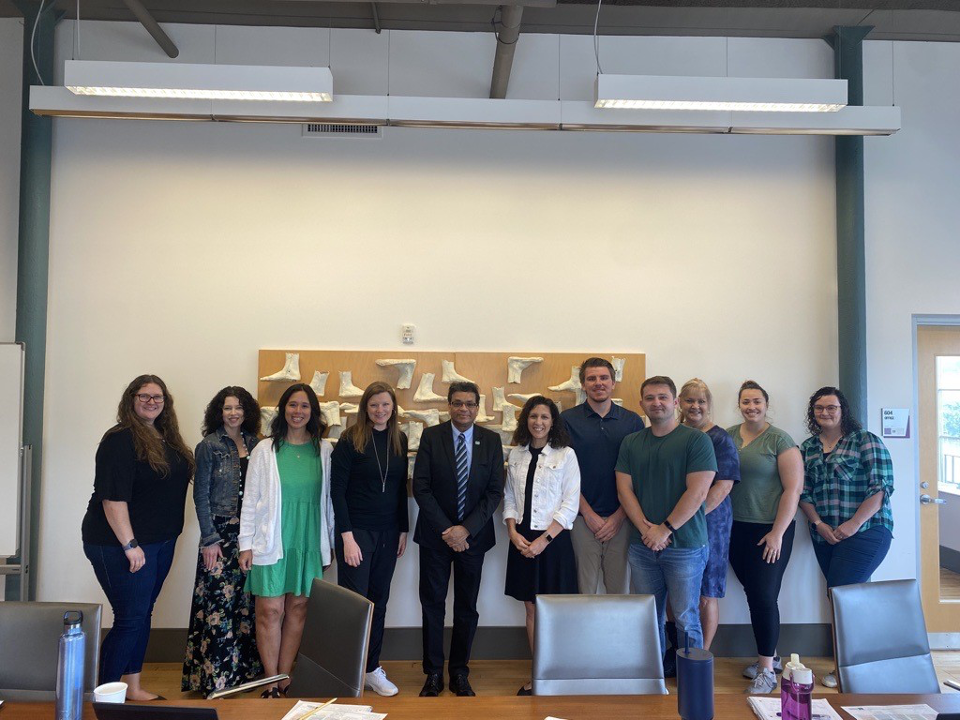

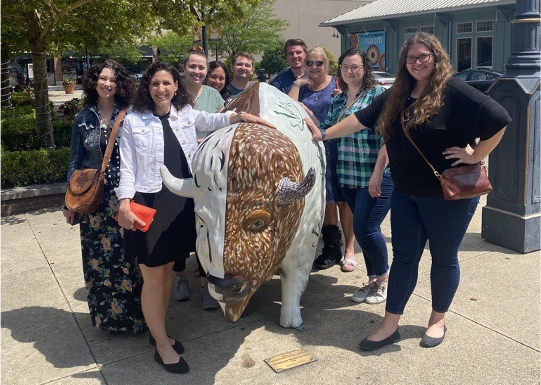
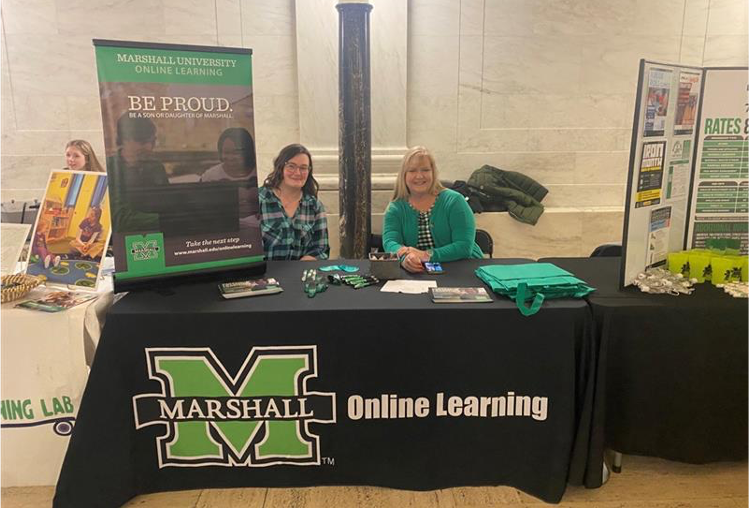

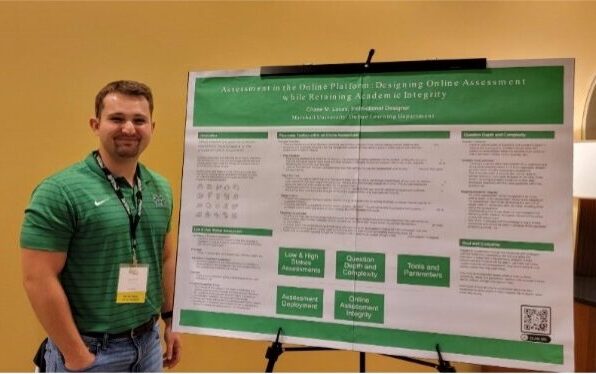
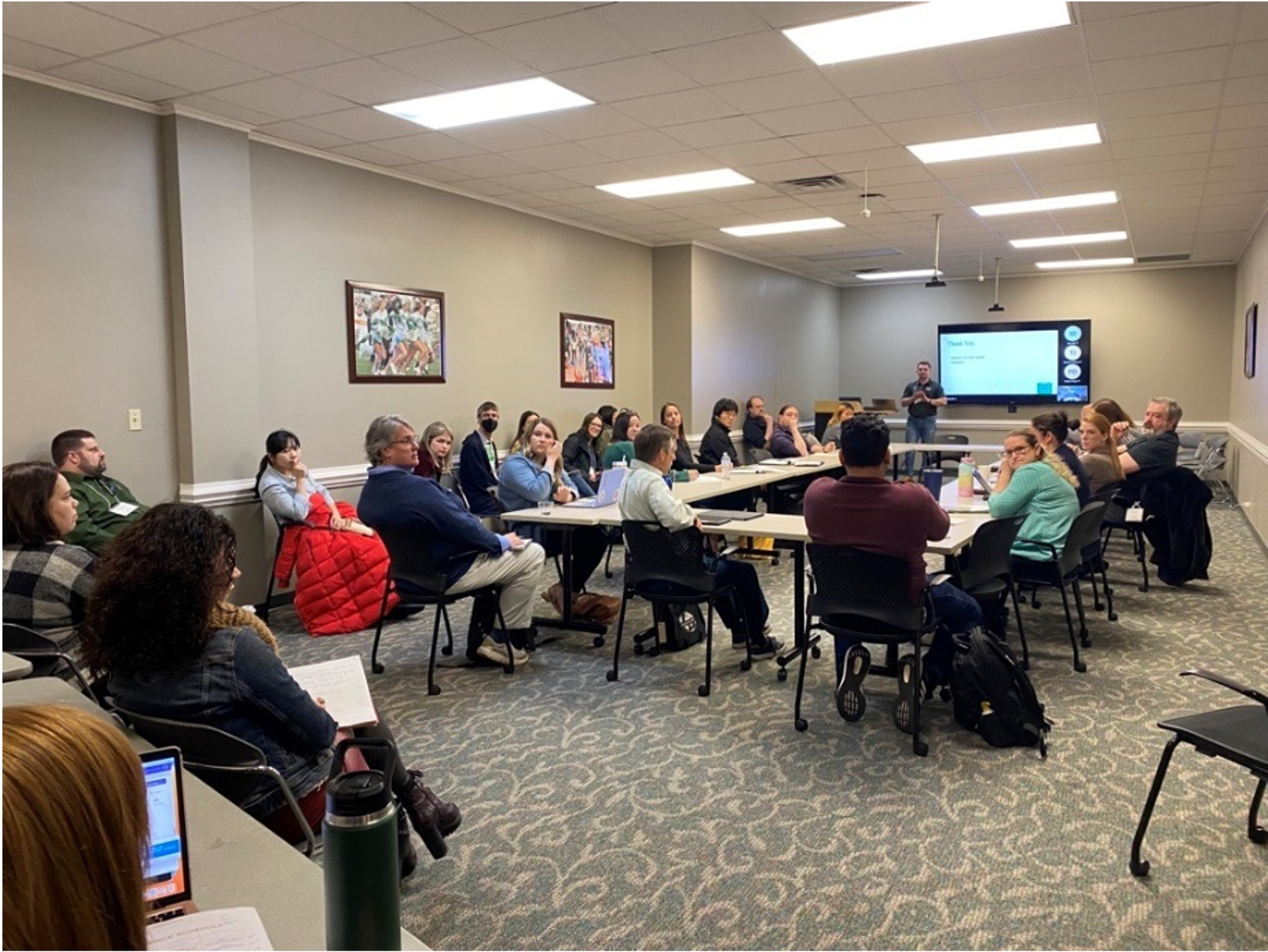
- Adams, Diana, Chase Lucas, Mary Welch, Hilary Gibson, and Heidi Blaisdell. “Re-Tooling Course Modules in the New Blackboard Ultra.”
- Gibson, Hilary. “Marshall Skills Exchange – Microcredentials at Marshall University.”
- Hall, Cody, Michelle Morrison, and Joseph Ritter. “The Online Student Journey.”
- Lucas, Chase. “Bridging the Gap: Creating a Sense of Belongingness in the Online Classroom.”
- Spears, Julia, and Jodie Penrod. “Considerations for an Enterprise HyFlex Implementation.”
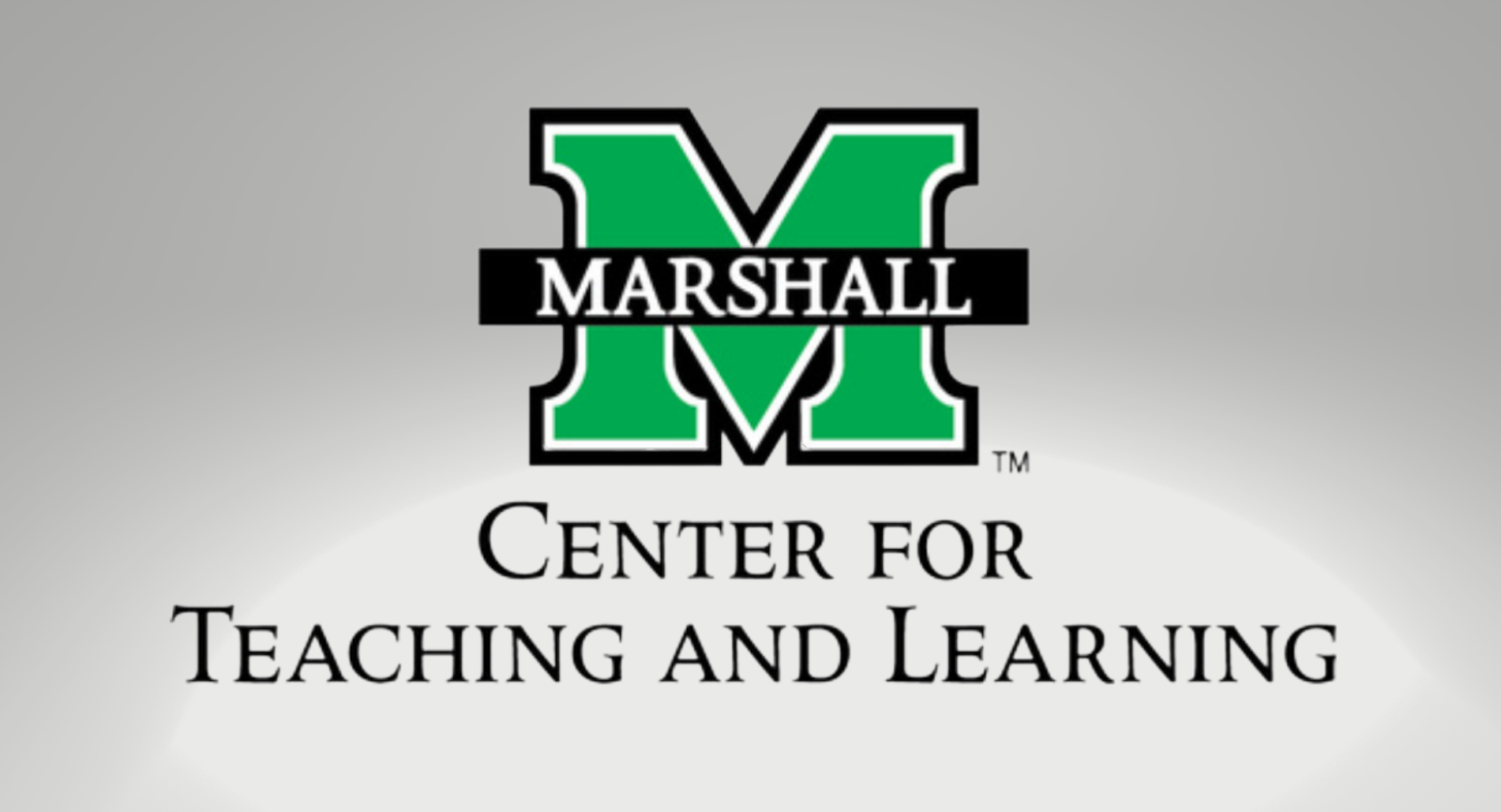
- Adams, Diana, and Jill Underhill. “Online Pedagogy and Practice.”

- Laton, Dena. “Copyright Basics.” https://libguides.marshall.edu/copyright
Assistant Provost of Online Education
and Certification
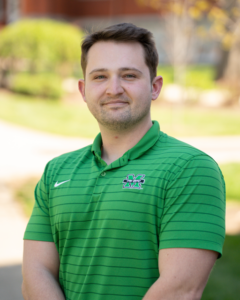
Instructional Designer
Phone: 304-696-3260
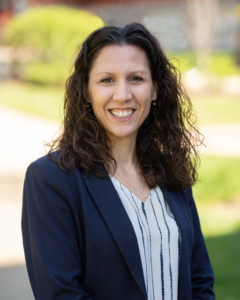
Instructional Designer
Phone: 304-696-2811

Graduate Assistant

Operations Coordinator
Phone: 304-696-6840
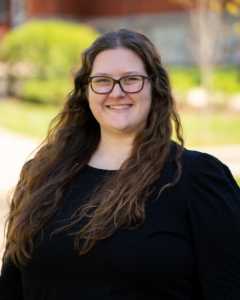
Instructional Designer
Phone: 304-696-5686

Senior Director of Student Engagement
Phone: 304-696-2548

Student Assistant
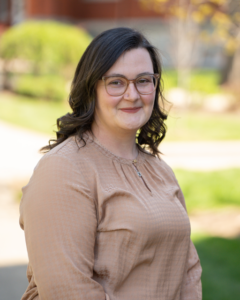
Senior Instructional Designer
Phone: 304-696-5226

Instructional Designer
Phone: 304-696-2711

Student Success Coordinator
Phone: 304-696-3141

Student Assistant




